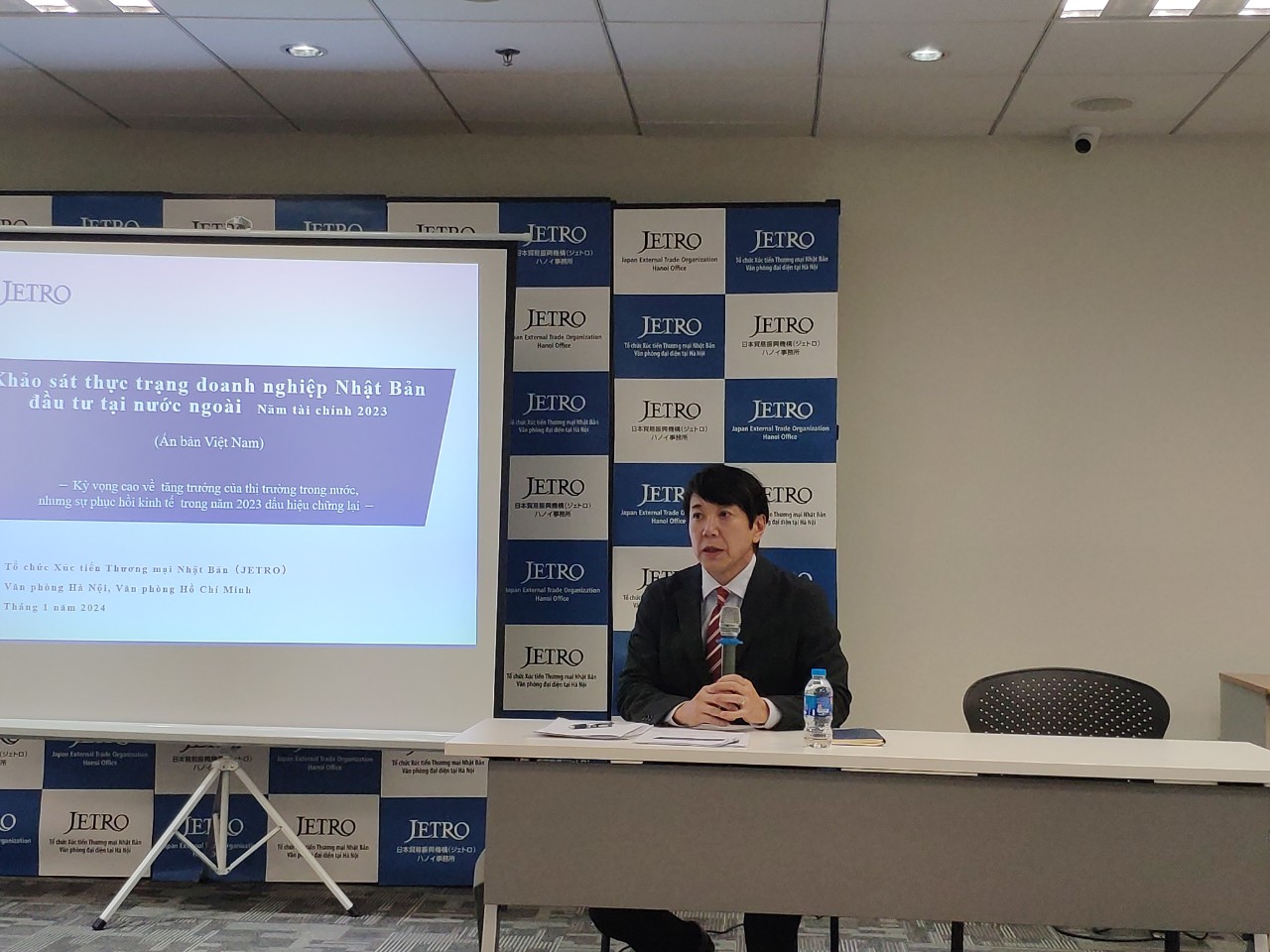Vietnam's market attractiveness is second only to US: JETRO
Vietnamese enterprises are gradually gaining a significant position in the global supply chain of Japanese companies.
Major Japanese corporations rate Vietnam’s market attractiveness and potential as second only to the US, according to the Chief Representative of the Japan External Trade Organization (JETRO) in Hanoi Takeo Nakajima.
| Chief Representative of the Japan External Trade Organization (JETRO) in Hanoi Takeo Nakajima. Photo: Ngoc Mai/The Hanoi Times |
“There are currently over 2000 Japanese enterprises investing in Vietnam. Meanwhile, the number of Japanese companies participating in the Japanese Business Association in Vietnam is the highest among similar associations in ASEAN, and it is on the rise,” Nakajima told The Hanoi Times during a press briefing held on January 26 to discuss findings of a survey taken from August 21 to September 20 on the performance of Japanese companies abroad in 2023.
Specifically, Nakajima noted nearly 57% of Japanese firms looking to expand their operations in Vietnam in the next one or two years, the highest among the top six ASEAN countries (Indonesia, Malaysia, Singapore, Thailand, the Philippines, and Vietnam).
Meanwhile, the percentage of businesses considering downsizing operations or relocating to another country reached 2.5%, indicating a 1.4 percentage point increase compared to the previous year's survey.
According to Nakajima, 849 Japanese companies participated in the survey in Vietnam, the highest number in the Asia-Pacific region.
“This reflects their active collaboration and optimism about the continuous improvement of Vietnam's business environment in the future,” he said.
In the said survey, the JETRO representative mentioned that 50.4% of the respondents anticipate profitability, a significant rise from the modest 32% recorded in the previous year. Conversely, only 8.3% foresee losses, a notable decrease from the 35.7% reported earlier. This underscores their confidence in Vietnam's economic prospects for the year 2024.
Nakajima believed that Vietnam's economic advantage lies in its market size, promising growth prospects, stable socio-political conditions, a skilled labor available at competitive costs.
However, looking in the opposite direction, he acknowledged that Vietnam needs to enhance its business environment by simplifying and increasing transparency in administrative procedures, including investment licensing, visa application, work permits, and tax policies.
Regarding the localization rate, Nakajima noted an improvement with a 4.6 percentage point increase to 41.9%. Nevertheless, only 17% of Vietnamese enterprises currently supply components to Japanese businesses.
“Vietnamese businesses need to invest in technology to shift to the production of high-value components, thereby increasing the localization rate,” he said.
However, it is worth noting that the localization rate in Vietnam has increased by 10% over the past 10 years, ranking second in the region in terms of growth rate, behind only India but still lower than China, Thailand, and India, he continued.
Overall, Nakajima suggested that the survey indicated a trend in which Vietnamese enterprises are gradually gaining a significant position in the global supply chain of Japanese companies. In particular, Vietnam, previously known for its low-cost production for export, is shifting to high-value-added production. Japanese companies in Vietnam are also increasingly focusing on investment and development functions and expanding into new areas in Vietnam.
"Therefore, Japanese businesses have high expectations for the Vietnamese market, especially as the localization rate in Vietnam is not yet high. This presents an opportunity for Japanese companies to invest here," Nakajima stated.
"JETRO is ready to play a role in connecting the two sides, hoping that Vietnamese businesses will seize the opportunity to strengthen cooperation with Japanese partners. However, to achieve this, Vietnamese enterprises need to enhance their quality, technology, and skills for a sustainable long-term connection between the two sides," he added.












